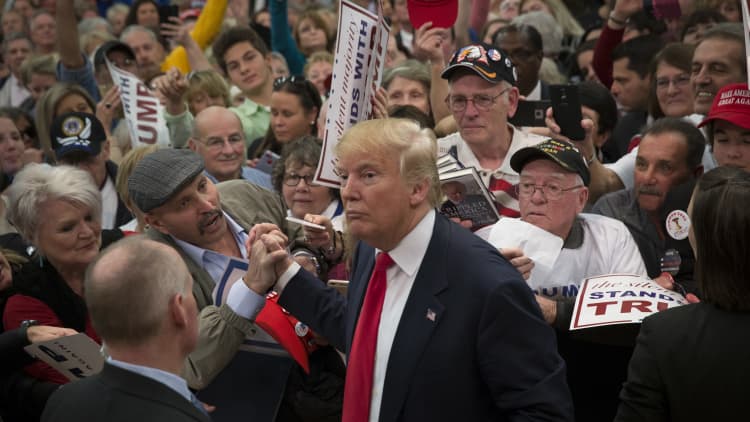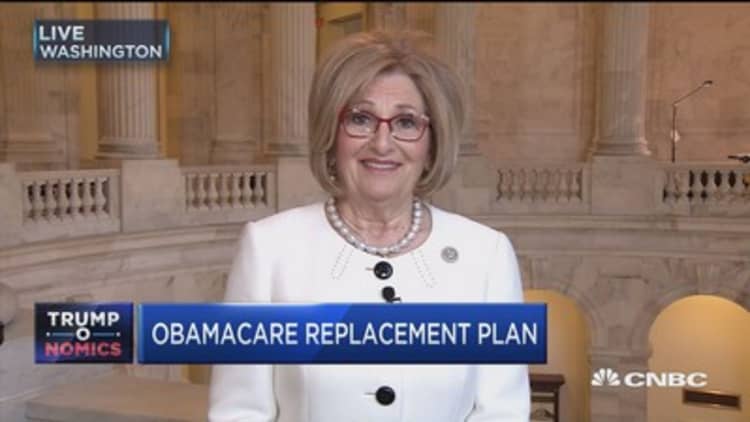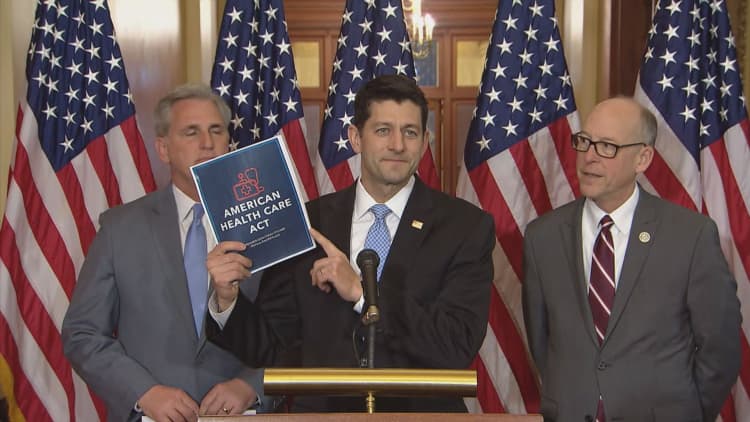
They might be his base, but they're sure not getting any special treatment.
President Donald Trump agreed Wednesday that voters in counties that backed Hillary Clinton would do better from tax cuts under the GOP's Obamacare repeal plan than those in counties he won in November.
Trump's acknowledgment came during an interview on Fox News, which released a poll that shows just a paltry 35 percent of the public approves of his handling of health care.
Trump supports the GOP bill, dubbed the American Health Care Act, which would repeal and replace key parts of Obamacare.
The bill on Thursday won approval from a third committee in the House. But in the process, the bill for the first time also drew two no votes from Republicans.
"This bill has as one of its centerpieces a tax cut for investors that would primarily benefit people making over $250,000 a year, already done pretty well in the past 10 years, as you know," Fox's Tucker Carlson said during his interview with the president.
"Yeah," Trump said.

Carlson continued: "A Bloomberg analysis shows that counties that voted for you, middle-class and working-class counties, would do far less well under this bill than the counties that voted for Hillary, the more affluent counties."
Trump said, "Oh, I know, I know."
The analysis found that the two individual tax cuts in the GOP bill would lead to an annual windfall of around $6.6 billion for taxpayers in counties that backed Trump.
But taxpayers in Clinton-backing counties would see more than three times that amount: around $21.9 billion
The money would come from the elimination of a 0.9 percent extra Medicare tax on wage income and a 3.8 percent investment income surtax, both of which apply only to high earners.
"It's very preliminary," Trump said, referring to the bill.
Carlson then pressed Trump, saying, "It seems like this maybe isn't consistent with the message of the last election," an apparent reference to Trump's promises during the campaign for a "massive tax relief for the middle class."
Trump replied, "No. A lot of things aren't consistent. But these are going to be negotiated."
"We will take care of our people, or I'm not signing it," Trump added. "If we're not going to take care of the people, I'm not signing anything."
House Speaker Paul Ryan, however, has said the bill's main components will remain in place. Ryan also has said that Trump co-wrote the bill along with fellow Republicans in the House and Senate.
The GOP bill is facing opposition from not just Democrats, who want to keep Obamacare as the law, but also from a number of Republicans in Congress.
Some Republican opponents say the law does not go far enough in repealing Obamacare; others fear it would harm people now covered by the Affordable Care Act, either through individual insurance plans or through Medicaid.
The concerns about coverage losses grew earlier this week when the Congressional Budget Office estimated that 14 million more people would be uninsured next year if the GOP bill becomes law than there would be if Obamacare remained in place. That number would grow to 24 million more uninsured people by 2026.
In addition to the bill giving Trump-leaning counties less in the way of tax relief than Clinton-supporting counties, it also could leave many Trump voters now covered by Obamacare with less purchasing power in the insurance market.

An analysis by the Center for Budget and Policy Priorities shows that the among the 39 states that use the federal Obamacare marketplace HealthCare.gov, the 10 states whose residents would lose the most in financial aid under Trumpcare all gave their electoral votes to Trump.
The bill's different effects on people who come from areas that tended to support Trump are the result of its proposed method of awarding aid to people who purchase private individual plans, as opposed to getting coverage through a job.
People with lower incomes, older people, residents of rural areas and people who live in areas with high insurance costs would get less financial help buying their plans under the American Health Care Act than they do under Obamacare.
Obamacare gives low- and middle-income consumers of individual plans tax credits that lower the cost of their monthly premiums, as long as they buy those plans on government-run marketplaces. The tax credits are tied to the price of insurance, and the value of the tax credits increases the lower one's income is.
Obamacare also gives customers with lower income additional subsidies, which reduces how much they must personally pay out of pocket toward deductibles, co-payments and coinsurance when they obtain health services.
The Republican bill would eliminate the out-of-pocket subsidies, which would tend to increase health costs for lower-income customers.
It also would give nearly all consumers of individual health plans a flat subsidy in the form of tax credits to help pay their monthly premiums.
Watch: Ryan says Trump helped write health care bill



